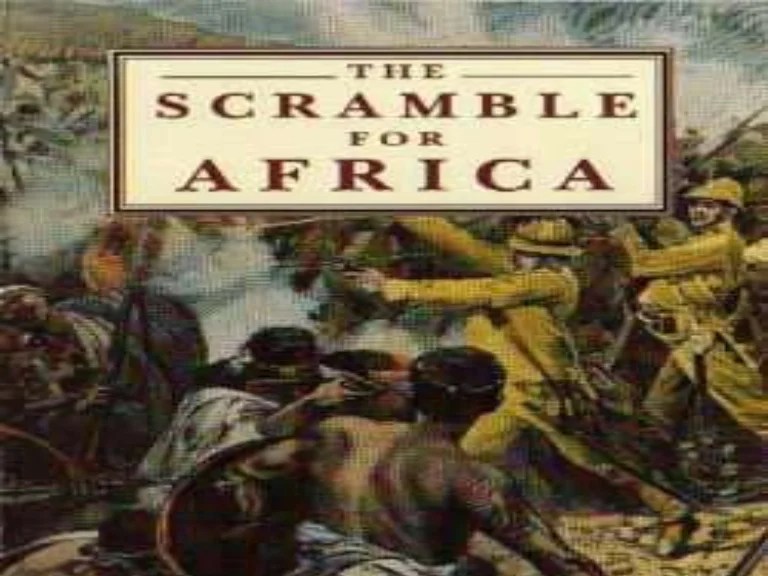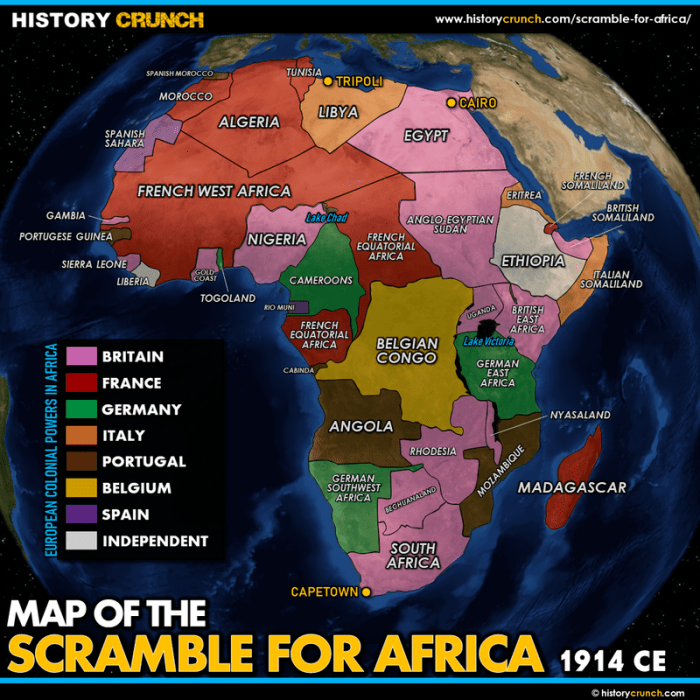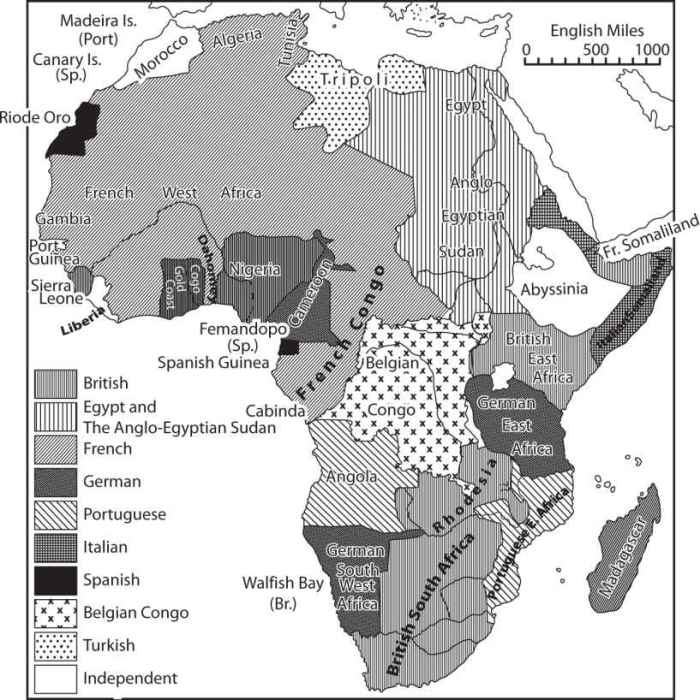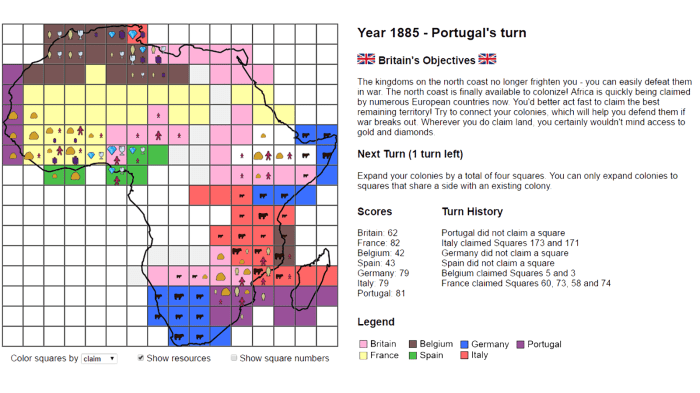Scramble for africa ap world history – The Scramble for Africa, a pivotal chapter in world history, sets the stage for this enthralling narrative. This tumultuous era witnessed European powers engage in a relentless pursuit of African territories, driven by motives of imperialism and fueled by the forces of industrialization and nationalism.
As the major European powers clashed over their respective ambitions, Africa became a battleground for their colonial aspirations, shaping its political, economic, and social landscape for centuries to come.
The Scramble for Africa unfolded as a complex interplay between European imperialism and African resistance. While European powers employed various strategies to establish and expand their colonial empires, African societies exhibited remarkable resilience and agency in their responses to foreign domination.
The diverse forms of resistance ranged from armed conflicts to diplomatic negotiations, reflecting the determination of African peoples to preserve their sovereignty and cultural identities.
Imperialism and European Rivalries: Scramble For Africa Ap World History

The Scramble for Africa, a period of intense European colonization in Africa from the 1880s to the early 1900s, was driven by a complex interplay of factors, including imperialism, industrialization, and nationalism.
Motives for Imperialism
European powers sought to expand their empires in Africa for various reasons, including:
- Economic gains: Access to raw materials, markets, and cheap labor
- Political power and prestige: Controlling territories and asserting dominance
- Nationalism: A desire to expand national boundaries and promote national identity
- Strategic advantages: Control of key ports, waterways, and military bases
- Missionary activities: Spreading Christianity and Western values
Role of Industrialization and Nationalism
Industrialization played a crucial role in fueling the scramble for Africa. European powers needed raw materials, such as rubber, cotton, and minerals, to sustain their industries. Additionally, nationalism fostered a sense of competition and rivalry among European nations, driving them to expand their empires and secure their interests.
Major European Powers and their Goals
The major European powers involved in the scramble for Africa included:
- Britain:Focused on controlling key territories in East, West, and Southern Africa for economic and strategic reasons.
- France:Expanded its empire in West and Central Africa, seeking to connect its colonies from the Atlantic to the Mediterranean.
- Germany:Entered the race late, but quickly acquired territories in East and Southwest Africa.
- Belgium:Gained control of the vast Congo Free State, known for its brutal exploitation of resources and people.
- Portugal:Maintained its long-held colonies in Angola and Mozambique.
African Resistance and Collaboration

African resistance to European colonization took various forms, including armed struggle, political resistance, and cultural resistance. Africans collaborated with European powers for economic, political, and military reasons.
Armed Resistance
- Direct military confrontations between African armies and European forces.
- Examples: Battle of Isandlwana (1879), Mahdist War (1881-1899).
- Led by African leaders such as Shaka Zulu, Samori Touré, and Menelik II.
Political Resistance
- Diplomatic negotiations and alliances with other African states or European powers.
- Resistance through boycotts, strikes, and civil disobedience.
- Examples: Ashanti Confederation’s resistance to British rule, Ethiopian diplomacy during the Scramble for Africa.
Cultural Resistance
- Preservation of traditional African customs, beliefs, and languages.
- Resistance to European cultural assimilation and Christianity.
- Examples: Maasai resistance to British colonial rule, Ethiopian Orthodox Church’s resistance to Catholic missionaries.
Reasons for African Collaboration, Scramble for africa ap world history
- Economic benefits:Trade opportunities, access to European goods, and employment.
- Political alliances:African leaders allied with European powers to gain military support against rivals or expand their territory.
- Technological superiority:European military and technological advantages made resistance difficult.
- Cultural influence:Some African elites adopted European values and sought to modernize their societies.
Impact of African Resistance and Collaboration
- Slowed down the pace of European colonization.
- Shaped the borders and political landscape of Africa.
- Created a legacy of resistance and collaboration that influenced later African history.
- Demonstrated the diversity and resilience of African societies in the face of European imperialism.
Partition of Africa
The partition of Africa refers to the period of European colonisation of the African continent during the late 19th century. This process was driven by the desire of European powers to expand their empires, access new resources, and establish strategic military bases.The
Berlin Conference of 1884-1885 was a pivotal event in the partition of Africa. Convened by German Chancellor Otto von Bismarck, the conference brought together representatives from 14 European nations and the United States. The conference established guidelines for European colonisation in Africa, including the principle of effective occupation, which stated that European powers could only claim territory that they had effectively occupied.European
powers used various methods to establish and expand their colonial empires in Africa. These included:
Military conquest
European powers used their superior military technology to defeat African armies and establish control over their territories.
Diplomatic agreements
European powers made treaties with African leaders, often under duress, to gain control of land and resources.
Economic coercion
European powers used economic pressure, such as trade embargoes and tariffs, to force African leaders to accept their terms.By 1900, most of Africa had been divided among European powers. The major European colonies in Africa at that time are shown in the table below:| Colony | European Power ||—|—|| Algeria | France || Angola | Portugal || Belgian Congo | Belgium || British East Africa | United Kingdom || British South Africa | United Kingdom || Egypt | United Kingdom || French Equatorial Africa | France || French West Africa | France || German East Africa | Germany || German South West Africa | Germany || Italian Eritrea | Italy || Italian Somaliland | Italy || Morocco | France || Mozambique | Portugal || Nigeria | United Kingdom || Rhodesia | United Kingdom || Sierra Leone | United Kingdom || Somalia | Italy || South Africa | United Kingdom || Sudan | United Kingdom || Tunisia | France || Uganda | United Kingdom || Zanzibar | United Kingdom |
Economic and Social Impact of Colonization

European colonization had a profound impact on African economies and societies. The introduction of new crops, technologies, and administrative systems led to significant changes in African economies. The imposition of colonial rule also had a profound impact on African social and cultural life, leading to the erosion of traditional values and the emergence of new forms of social organization.
Economic Consequences of Colonization
One of the most significant economic consequences of European colonization was the introduction of new crops and technologies. The introduction of cash crops, such as cotton, coffee, and cocoa, led to the development of a plantation economy in many parts of Africa.
This had a number of negative consequences, including the displacement of traditional subsistence agriculture, the exploitation of African labor, and the environmental degradation of the land.
The introduction of new technologies, such as the telegraph and the steamship, also had a significant impact on African economies. These technologies facilitated the movement of goods and people, which led to the growth of trade and the development of new markets.
However, the benefits of these technologies were not evenly distributed, and many African communities were left out of the economic benefits of colonization.
Social and Cultural Impact of Colonization
The imposition of colonial rule also had a profound impact on African social and cultural life. The introduction of European education and Christianity led to the erosion of traditional values and the emergence of new forms of social organization. The colonial powers also imposed their own legal systems and administrative structures on African societies, which further undermined traditional forms of authority.
The social and cultural impact of colonization was not uniform across Africa. In some areas, the colonial powers were able to establish a relatively stable and prosperous colonial regime. In other areas, however, the imposition of colonial rule led to conflict and violence.
The experience of colonization also varied depending on the specific colonial power involved. The British, for example, were more likely to impose their own values and institutions on African societies than the French, who were more likely to adopt a policy of assimilation.
Legacy of the Scramble for Africa

The Scramble for Africa had profound and lasting consequences for the continent, shaping its political, economic, and social landscape for decades to come.
Political Consequences:
- Arbitrary Boundaries:European powers carved up Africa into colonies with little regard for ethnic, linguistic, or cultural boundaries, creating artificial divisions that persist today.
- Weak States:Colonial powers often established weak and dependent states, lacking the capacity to govern effectively or address the needs of their populations.
- Conflict and Instability:The arbitrary boundaries and weak states created conditions for conflict and instability, which continue to plague many African countries.
Economic Consequences:
- Resource Extraction:European powers exploited Africa’s resources, such as minerals, cash crops, and labor, for their own economic benefit.
- Economic Dependence:African economies became dependent on the production and export of a few primary commodities, leaving them vulnerable to fluctuations in global markets.
- Underdevelopment:Colonial policies hindered the development of local industries and infrastructure, perpetuating underdevelopment.
Social Consequences:
- Cultural Suppression:European powers suppressed African cultures, languages, and traditions, imposing their own values and institutions.
- Racial Hierarchy:Colonialism created a racial hierarchy, with Europeans at the top and Africans at the bottom, leading to discrimination and oppression.
- Social Fragmentation:Colonial powers often divided African societies along ethnic or religious lines, exacerbating social tensions.
Ongoing Debates about the Legacy of Colonialism
The legacy of colonialism in Africa remains a subject of ongoing debate, with different perspectives on its impact:
- Negative Perspective:Critics argue that colonialism had a devastating impact on Africa, causing underdevelopment, conflict, and cultural loss.
- Positive Perspective:Some scholars argue that colonialism brought modernization, infrastructure, and education to Africa, paving the way for progress.
- Balanced Perspective:Most historians acknowledge both the negative and positive aspects of colonialism, recognizing its complex and multifaceted impact.
Major Political Boundaries Established during the Scramble for Africa
| Region | European Power | Major Boundaries | Impact on Modern-Day Africa |
|---|---|---|---|
| West Africa | France, Britain | Niger River, Senegal River | Divided ethnic groups, created border conflicts |
| East Africa | Germany, Britain | Zanzibar, Lake Victoria | Isolated landlocked countries, disrupted trade routes |
| Central Africa | France, Belgium | Congo River, Great Lakes | Fragmented states, ethnic tensions |
| Southern Africa | Britain | Orange River, Limpopo River | Apartheid in South Africa, land dispossession |
Questions and Answers
What were the primary motivations behind European imperialism in Africa?
Economic exploitation, access to raw materials, and the desire for political and military dominance were key factors driving European imperialism in Africa.
How did the Berlin Conference of 1884-1885 contribute to the Scramble for Africa?
The Berlin Conference formalized the partition of Africa among European powers, establishing rules for colonial expansion and recognizing the principle of effective occupation.
What were the major forms of African resistance to European colonization?
African resistance took various forms, including armed uprisings, diplomatic negotiations, cultural preservation, and economic boycotts.
What were the long-term consequences of the Scramble for Africa?
The Scramble for Africa left a lasting legacy of political instability, economic underdevelopment, and social inequality in many African nations.
